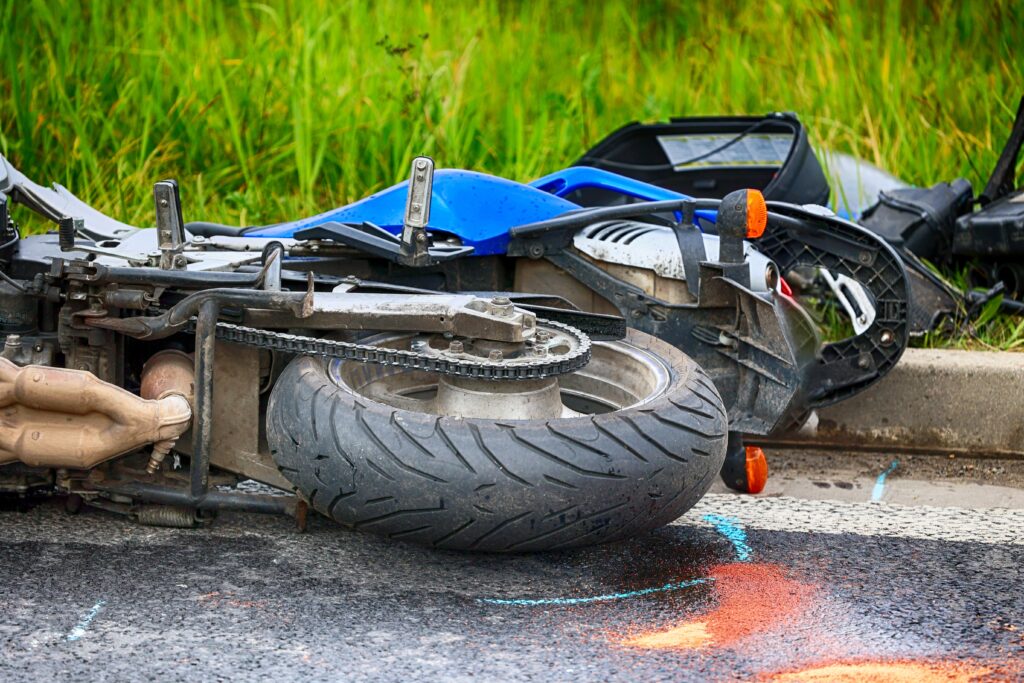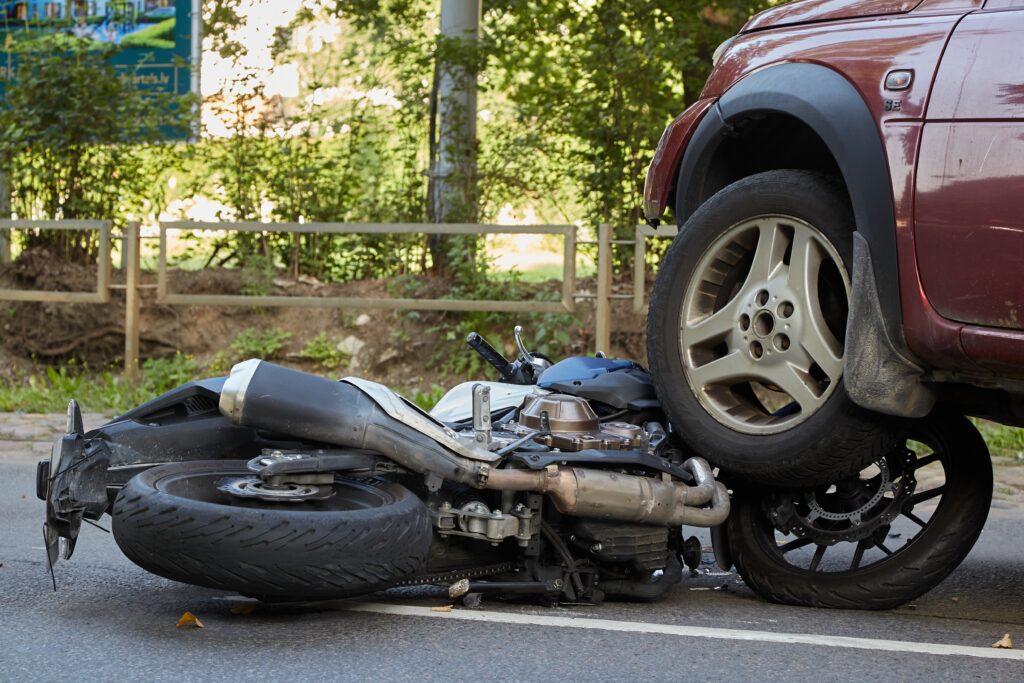Motorcycle accidents frequently occur when drivers are negligent, such as failing to follow traffic laws or engaging in distracted driving. If you sustained injuries in a recent motorcycle collision, an experienced Lincoln motorcycle accident lawyer in your area can be an invaluable help. Your lawyer can swiftly evaluate the circumstances surrounding your collision, file a claim or lawsuit on your behalf, and pursue the compensation you need to become whole again.
How Do Motorcycle Collisions Result from Others’ Negligence?
Motorcycle accidents often result from the negligence of other drivers. Here are the most common ways these accidents occur:

- Distracted Driving: One of the leading causes of motorcycle accidents is distracted driving. When drivers are texting, talking on the phone, eating, or fiddling with their GPS, they are not paying full attention to the road. This lack of attention can result in their not seeing a motorcyclist, leading to dangerous collisions.
- Failure to Yield: Motorcyclists often face danger when other drivers fail to yield the right-of-way. This can happen at intersections, where a car might turn left in front of an oncoming motorcycle. Such misjudgments or outright ignorance of traffic rules can have severe consequences for motorcyclists.
- Speeding: Speeding reduces a driver’s reaction time and increases the severity of crashes. When other vehicles travel at high speeds, they might not have enough time to stop or maneuver to avoid hitting a motorcycle. The effect of a speeding vehicle on a motorcycle can be catastrophic due to the significant difference in mass and protection.
- Impaired Driving: Driving under the influence of alcohol or drugs impairs judgment, reaction time, and coordination. Impaired drivers are a serious threat to motorcyclists, who rely on the responsible behavior of other drivers to stay safe. The unpredictable actions of an impaired driver can lead to deadly collisions.
- Lane Changes: Motorcycles are smaller and less visible than cars, so drivers need to be extra cautious when changing lanes. Many collisions happen because a driver did not check their blind spot or did not signal before switching lanes. This can cause them to sideswipe a motorcycle or force the rider to make a sudden maneuver to avoid a crash.
- Tailgating: Following too closely is dangerous for any vehicle but especially hazardous for motorcycles. If a car is tailgating a motorcycle and the rider has to brake suddenly, the car might not stop in time, leading to a rear-end collision. Motorcycles do not have the same stopping ability as cars, making tailgating particularly risky.
- Road Hazards: Negligent road maintenance can also lead to crashes. Potholes, uneven surfaces, debris, and oil spills pose significant risks to motorcyclists. Drivers who swerve to avoid these hazards without checking for motorcycles can also cause accidents.
How To Prove Negligence in a Motorcycle Crash
Proving negligence in a motorcycle accident claim or lawsuit involves demonstrating that another party’s careless actions caused the collision and resulting injuries. Here are the key elements you need to establish:
- Duty of Care: The first step is to show that the other party owed a duty of care to you. In the context of driving, this is usually straightforward. Every driver has a legal responsibility to drive safely and follow traffic laws to prevent harm to others on the road, including motorcyclists.
- Breach of Duty: Next, you need to prove that the other party breached this duty of care. This means showing that the driver acted in a way that a reasonably careful person would not have. Examples include speeding, running a red light, texting while driving, or making an unsafe lane change. Evidence like traffic camera footage, witness statements, or police reports can help demonstrate this breach.
- Causation: It is not enough to show that the other driver was careless; you must also prove that their negligence directly caused the accident. This involves linking their actions to your injuries. For instance, if a driver ran a red light and hit your motorcycle, causing you to be thrown off and injured, you need to show that these injuries were a direct result of the crash. Medical records, accident reconstruction reports, and expert testimony can be crucial here.
- Damages: Finally, you need to prove that you suffered damages as a result of the collision. Damages can include medical expenses, lost income, pain and suffering, and property damage. Collecting all medical bills, repair receipts, and documentation of missed work can help to establish the full extent of your damages. Personal testimony about your pain, suffering, and any lasting effects on your life can also support your claim or lawsuit for compensation.
In a motorcycle accident claim, an experienced lawyer can gather and present evidence supporting these legal elements. They can interview witnesses, obtain traffic camera footage, consult with experts, and compile all necessary documentation to build a strong case on your behalf.
Common Injuries in Motorcycle Crashes

Motorcycle accidents can lead to a range of severe injuries due to the lack of protection compared to cars. Unlike the occupants of enclosed vehicles, motorcyclists are directly exposed to their surrounding environment – including the ground – and stand to suffer extremely serious injuries in a crash scenario. Some of the most common injuries, along with the types of medical treatment that may be necessary, include the following:
- Fractures and Broken Bones: One of the most frequent injuries in motorcycle accidents is broken bones. Common fractures include those in the arms, legs, ribs, and pelvis. Treatment usually involves immobilization with casts or splints and sometimes surgery to realign and stabilize the bones with pins or plates. Physical therapy is often necessary to restore strength and mobility.
- Head Injuries: Even with a helmet, motorcyclists can suffer head injuries, including concussions, skull fractures, or more severe traumatic brain injuries (TBIs). Immediate medical evaluation is vital. Treatment may involve monitoring in the hospital, medication to manage symptoms, and possibly surgery to address any bleeding or swelling. Long-term rehabilitation and therapy may also be required for TBIs to aid cognitive and physical recovery.
- Spinal Cord Injuries: Injuries to the spinal cord can result in partial or complete paralysis. Treatment often starts with emergency stabilization to prevent further damage, followed by surgery if needed. Ongoing rehabilitation, including physical and occupational therapy, is essential for maximizing recovery and adapting to any permanent changes in function.
- Road Rash: Road rash occurs when a rider slides along the pavement, causing abrasions and skin damage. Treatment includes cleaning the wounds to prevent infection, applying antibiotic ointments, and dressing the wounds. Severe cases might require skin grafts and extensive wound care.
- Internal Injuries: Motorcycles offer little protection in crashes, leading to potential internal injuries, such as damage to organs or internal bleeding. Diagnosis typically involves imaging tests like CT scans or MRIs. Treatment may include surgery to repair damaged organs or stop internal bleeding, followed by intensive care and monitoring.
- Soft Tissue Injuries: These include sprains, strains, and tears in muscles and ligaments. Treatment generally involves rest, ice, compression, elevation (RICE), and physical therapy to restore function and strength.
Favorably Settling a Motorcycle Accident Case
Settling a motorcycle accident case involves several important steps to ensure you receive fair compensation for your injuries and damages. The following is a step-by-step guide to help you through the process:
- Seek Ongoing Medical Attention: Seeking ongoing medical attention not only ensures your health but also creates a medical record that will be important for your case.

- Document the Accident: Gather and retain as much evidence as possible from the accident scene. This includes photographs of the damage to your motorcycle, the accident scene itself, and any visible injuries you sustained. Keep contact information from witnesses and obtain a copy of the police report. This documentation will support your claim and help to establish fault for the crash.
- Notify Your Insurance Company: Report the crash to your insurance company as soon as possible. Provide them with the necessary information and cooperate with their investigation. This is important in starting the process of filing a claim.
- Consult with a Lawyer: It is wise to consult with a personal injury lawyer who is experienced in motorcycle accidents. They can provide valuable advice, explain your rights, and assist in navigating the legal system. An attorney can also negotiate with insurance companies on your behalf to ensure you receive fair compensation.
- Calculate Your Damages: Determine the total value of your claim by calculating all your damages. This includes medical expenses, lost income, property damage, pain and suffering, and any other related costs. Your motorcycle accident attorney can accurately assess these damages and account for all your losses.
- Negotiate with the Insurance Company: Many times insurance companies offer settlements that are far lower than what you are entitled to recover. Your lawyer will negotiate with them to try and reach a fair settlement. A personal injury lawyer can also use the gathered evidence and documentation to strengthen your case.
- Review and Accept a Settlement Offer: If the insurance company makes a settlement offer, review it carefully with your lawyer. They will determine if the offer is fair and if it covers all of your damages. If it is fair, you can accept the offer; if not, further negotiations may be necessary.
- Sign a Release Form: Once you accept a settlement, you will sign a release form. This form means that you agree not to pursue further legal action related to the accident. Your attorney will ensure that you fully understand the implications before signing.
By following these steps and working closely with your motorcycle accident lawyer, you can effectively settle your motorcycle accident case and secure the full compensation you deserve.
Compensation for Injuries in a Motorcycle Crash
Following a motorcycle crash, you may be entitled to various types of compensation for your injuries and losses. Here are the main categories of compensation you can recover:
- Medical Expenses: This includes all costs related to treating your injuries. It covers hospital bills, doctor’s visits, surgery costs, prescription medications, and any ongoing medical treatments or physical therapy you may need. If you have to use medical equipment or require special care, these expenses are also included.
- Lost income: If your injuries prevent you from working, you can recover compensation for the income you have lost. This includes both the income you missed while recovering and any future lost earnings (i.e., if your injuries affect your ability to work long-term). Documentation from your employer about missed work and potential future earnings will help support this claim.
- Property Damage: You can be compensated for the damage to your motorcycle and any personal property damaged in the collision. This compensation includes repair costs or the replacement value if your motorcycle is totaled. It also covers any other damaged items, like helmets or personal gear.
- Pain and Suffering: This type of compensation addresses the physical pain and emotional distress that the motorcycle collision and your injuries caused. It includes the suffering you endure, the repercussions on your quality of life, and the emotional trauma you experience. This amount is more subjective and often calculated based on the severity of your injuries and their effect on your life.
- Emotional Distress: Beyond general pain and suffering, you may receive compensation for severe emotional distress or psychological effects such as anxiety, depression, or post-traumatic stress disorder (PTSD) resulting from the crash. Testimony from mental health professionals can support your claim for this type of damage.
- Loss of Consortium: If your injuries significantly affect your relationship with your spouse or partner, they may be entitled to compensation for loss of consortium. This covers the loss of companionship, support, and intimacy your injuries caused.
- Punitive Damages: In cases where the other party’s conduct was especially reckless or egregious, you may be eligible for punitive damages. These damages are meant to punish the at-fault party for their extreme negligence or recklessness.

Contact a Knowledgeable Motorcycle Accident Attorney in Your Area Today
If you sustained injuries in a motorcycle collision, you want an experienced personal injury attorney in Lincoln representing you throughout the process. Your lawyer can fight for your rights and work to secure the justice and financial compensation you deserve for your accident-related losses.